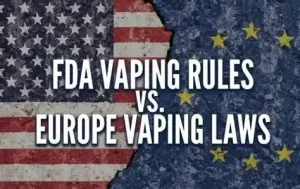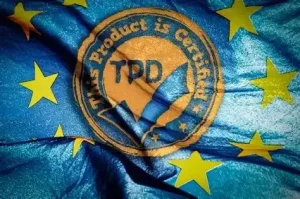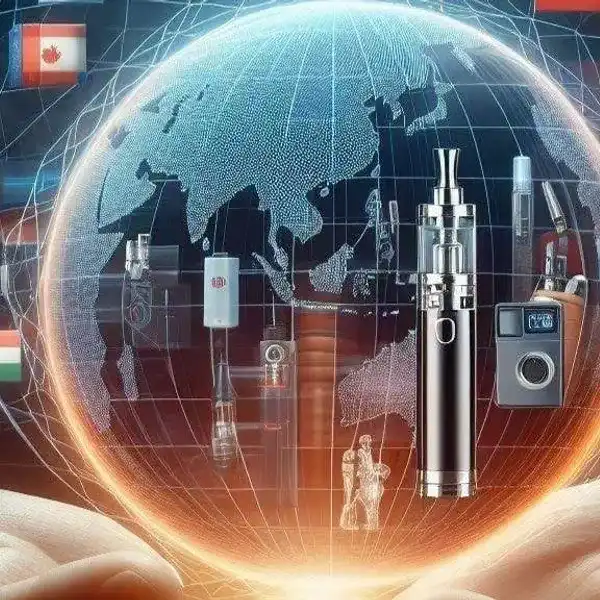Vape laws: Navigating Global E-Cigarette Regulatory Frameworks – Strong Policies Safeguarding Health and Progress
As soon as vapes appeared, they became popular with the claims that they were “less harmful than cigarettes” and “can help people quit smoking.” However, the public health problems it brought, especially the impact on young people, prompted countries to quickly introduce Vape laws. Vape laws are not only related to everyone’s health, but also determine how far the e-cigarette industry can go. Only by understanding the Vape laws in different places can we understand how this emerging field is regulated.
The basic framework of global Vape laws
There is no unified e-cigarettes law standard in the world, but the regulatory focus of most countries is similar. Age restrictions are almost all in all e-cigarettes laws. Most countries stipulate that the minimum age for buying vapes is the same as buying traditional cigarettes, generally 18 or 21 years old. Many states in the United States have raised the age for buying e-cigarettes to 21 years old, and merchants must carefully check the buyer’s ID card. If they do not do so, they will have to pay a large fine.
Controlling sales channels is also a very important item in e-cigarettes laws. Some countries allow e-cigarettes to be sold in ordinary stores, but they have to set up a separate area; some simply do not allow them to be sold online, fearing that young people can buy them easily. Canada’s Vape laws stipulate that e-cigarettes cannot be sold in convenience stores, but can only be sold in stores with special licenses, and they must also post conspicuous health warnings.
Restrictions on advertising and promotion are also common in e-cigarettes laws. Many countries do not allow e-cigarettes to be advertised on TV or the Internet, for fear of attracting young people. The UK’s e-cigarettes laws allow e-cigarettes to be advertised, but the content cannot say that they are good for health, and cartoon characters or celebrities cannot be used as endorsements.
Requirements for ingredients and packaging are also written into e-cigarettes laws. The EU’s e-cigarettes laws require that the nicotine concentration in the e-liquid cannot exceed 20mg/ml, and the packaging must have a clear health warning, and the ingredients and content must be marked. These regulations are designed to make buyers clearly aware of the risks of the product.
Vape laws in major countries

The US Vape laws are quite complicated because both the federal government and state governments can manage them. At the federal level, the FDA (Food and Drug Administration) is responsible for setting and enforcing Vape laws. In 2016, the FDA classified e-cigarettes as tobacco products, and all e-cigarette products must be approved by the FDA before they can be put on the market.
As a result, many small brands had to withdraw from the market because they could not afford the approval fee. Among the states, California has the strictest e-cigarettes laws, prohibiting the use of e-cigarettes in public places and imposing high taxes on e-cigarettes. Texas is more relaxed, only requiring businesses not to sell to minors, and not strictly controlling the use of e-cigarettes in public places.
The EU’s Vape laws are mainly based on the Tobacco Products Directive (TPD), and all 27 member states must follow it. According to the TPD, the e-cigarette device’s e-liquid capacity cannot exceed 2ml, and a single bottle of e-liquid can only hold a maximum of 10ml. This means that sellers cannot sell large bottles of e-liquid, and must check the product specifications before shipping. The packaging must be written in black and white with “Nicotine is addictive”, and the size of the words cannot be less than 30% of the packaging area. There must not be any cartoon patterns or misleading propaganda.
China’s Vape laws have changed a lot in 2022. Before this, although there was no unified national regulation on e-cigarettes, some cities have begun to restrict them. In October 2022, the State Tobacco Monopoly Administration issued a notice clearly stating that e-cigarettes are tobacco products and should be regulated by the tobacco monopoly. Now, China’s Vape laws stipulate that they cannot be sold to minors, cannot be sold online, and must be sold offline with a monopoly license. The requirements are also strict during production and must meet national quality standards. These e-cigarettes laws came out to control the momentum of the chaotic development of e-cigarettes and protect the health of young people.
The core controversy behind the Vape laws

When the Vape laws were formulated, there was always a lot of debate. How to balance public health and industry development is the focus of the debate. Those who support strict control of e-cigarettes laws think that even if e-cigarettes are less harmful than traditional cigarettes, they still contain nicotine, which can make people addicted, especially young people who may smoke cigarettes in the future once they touch them. Opponents say that e-cigarettes can help smokers quit smoking, and e-cigarettes laws are too strict, which will prevent them from reducing harm and will also block the development of emerging industries.
How to grasp the scale of protecting teenagers is also a point of debate in Vape laws. Vape laws in many countries focus on preventing teenagers from contacting them, such as prohibiting the sale of flavored e-cigarettes and restricting advertising. But some people think that it may not be reasonable to completely prohibit the sale of flavored e-cigarettes, because adults may be more likely to quit smoking with flavored e-cigarettes. Moreover, even if there are restrictions on e-cigarettes laws, young people may still get e-cigarettes through other channels. The key is whether the implementation is in place, not just relying on prohibition.
Poor international coordination also affects the effectiveness of Vape laws. E-cigarettes are products sold all over the world, and cross-border sales are common. However, the e-cigarettes laws of different countries vary greatly. Some allow the sale of e-cigarettes, while others do not, which makes supervision more difficult. Smuggling and illegal cross-border sales often occur, making it difficult for e-cigarettes laws to really work. Many experts call for strengthening international cooperation and promoting the unification of e-cigarettes laws, but because the situations in different countries are different, it is difficult to do so in the short term.

Future development trend of Vape laws
From the current situation, Vape laws will become more detailed and stricter. As the research on the harm of e-cigarettes becomes more and more in-depth, more countries will change Vape laws based on the research results. For example, new research finds that a certain ingredient is more harmful, and the relevant e-cigarettes laws may restrict the use of this ingredient.
Technological progress will push Vape laws to be updated. Vape technology has been improving, and now there are new products such as heated cigarettes and nicotine-free e-liquids. With the emergence of these new products, the existing Vape laws are no longer sufficient, and regulatory authorities must quickly change the regulations to ensure that all types of e-cigarettes can be properly managed.
The opinions of ordinary people will be more valued when formulating Vape laws. In the past, Vape laws were mostly decided by the government and experts, but in the future, more opinions from ordinary people may be added. For example, hearings and questionnaires can be held to understand people’s attitudes and needs towards e-cigarettes, so that Vape laws can be more in line with the actual situation.
International cooperation will gradually strengthen. Although e-cigarettes laws in different countries are different now, in the face of global problems brought about by e-cigarettes, strengthening cooperation is certain. It may start with regional cooperation, such as making Vape laws more unified within the EU, and then slowly expand to more countries to form some basic regulatory consensus.
The development process of Vape laws is actually a process of deepening society’s understanding of emerging products. It is a complex balancing process that not only protects public health, but also considers industry development and personal choices. No matter how Vape laws change, the core is to allow e-cigarettes to develop within a controllable range, reduce harm, and play its possible positive role. For ordinary consumers, understanding the Vape laws in their area and abiding by the regulations is responsible for themselves and society.
